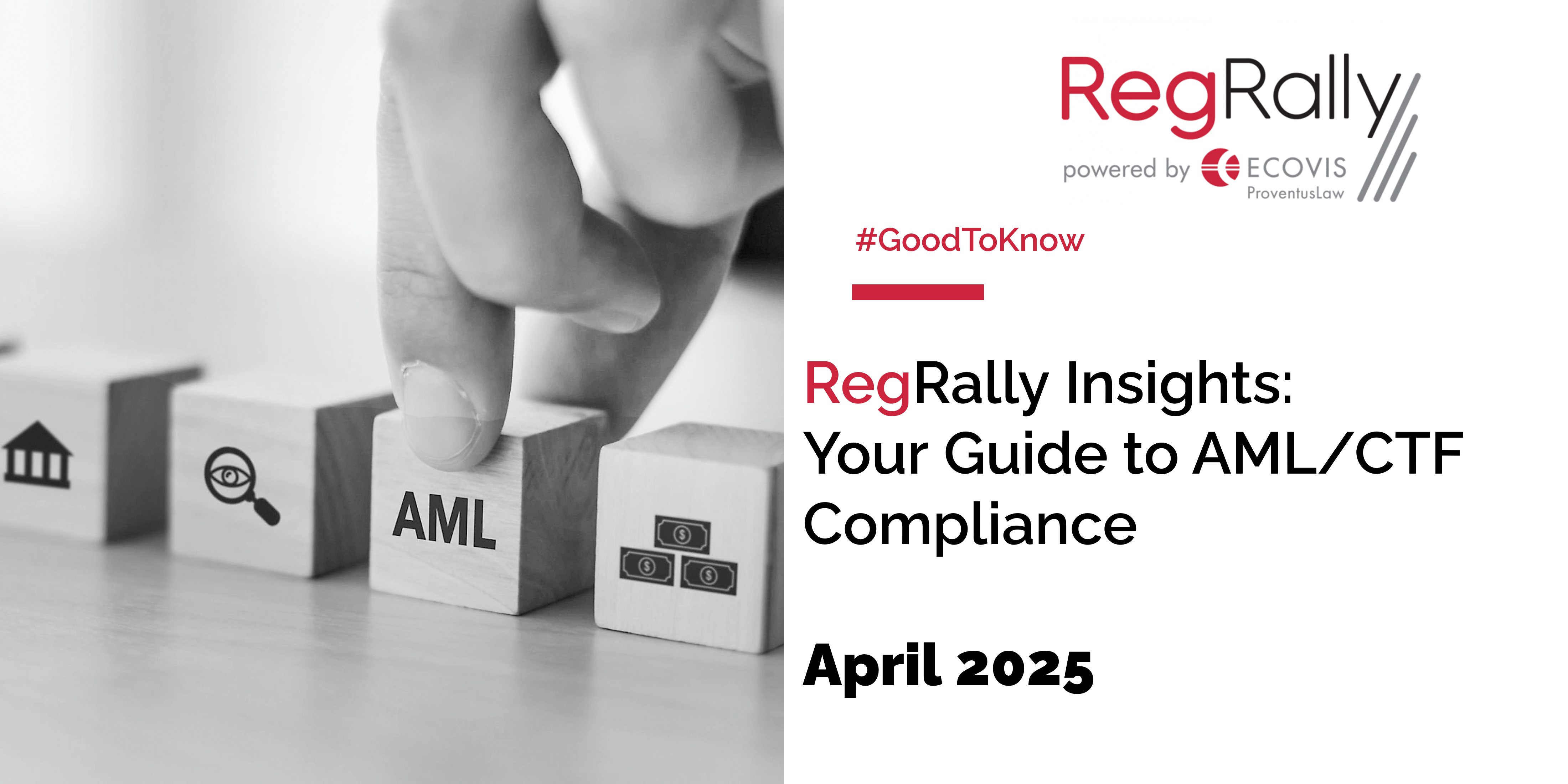ECOVIS ProventusLaw welcomes you to its monthly newsletter on Anti-Money Laundering and Counter-Terrorist Financing. It is dedicated to everyone who wants to understand the latest trends and developments, get tips from our experts and deepen their knowledge.
Lithuanian Court Reduces Fine for Exmo Exchange in AML Case
The Regional Administrative Court partially upheld UAB “Exmo Exchange”’s complaint against the FCIS. The court confirmed that the company violated the Anti-Money Laundering and Terrorist Financing Prevention Act, particularly in customer identity verification, risk assessment, and internal control procedures. However, the court acknowledged that the company had not been previously fined and was addressing the identified deficiencies. As a result, the court reduced the fine from €110,200 to €88,000, considering the company’s efforts to comply with the regulations.
EBA Launches Consultation on AML/CFT Regulatory Standards
The European Banking Authority (EBA) has initiated a public consultation on four draft Regulatory Technical Standards (RTS) to support the EU’s new Anti-Money Laundering and Countering the Financing of Terrorism (AML/CFT) framework. These RTSs will provide financial institutions and supervisory authorities with clear guidelines to ensure compliance with the revised legal framework.
Key Proposals:
- Direct Supervision Criteria: This criteria defines how the Anti-Money Laundering Authority (AMLA) will determine which financial institutions are under its direct supervision.
- Harmonised Risk Assessment Methodology: Establishes a consistent approach for evaluating money laundering and terrorist financing (ML/TF) risks.
- Customer Due Diligence (CDD) Requirements: Clarifies CDD obligations to ensure a standardised approach across Member States.
- Sanctions and Penalties Framework: Outlines a uniform system for enforcing AML/CFT regulations and imposing penalties.
Next Steps:
- The consultation is open until 6 June 2025 via the EBA website.
- The final draft will be submitted to the European Commission by 31 October 2025.
Risk Analysis Centre Sets 2024 Priorities After Reviewing €7M in Financial Irregularities
The Risk Analysis Centre (RAC) held its first meeting of the year at the FNTT headquarters, where representatives from various Lithuanian agencies reviewed last year’s high-risk sectors, including construction, automotive trade, and e-commerce. Nearly 5,000 inspections uncovered €2 million in potential damage and over €5 million in unpaid amounts. The RAC also set its 2024 priorities, focusing on VAT fraud, tax evasion, and income non-reporting, with regional Joint Operations Centres implementing action plans.
Lithuania’s EMI and PSI Sector Grows by 25%, Driven by Key Market Players
In 2024, Lithuania’s electronic money and payment institutions (EMIs and PSIs) experienced strong financial growth, with licensing revenues increasing by 25% to €622 million and payment transactions rising by 33% to €152 billion. The market remained concentrated, with the top ten institutions generating over 60% of revenues and 66% of transactions, while smaller firms had limited market impact. Despite a slight participant decline, all institutions met equity capital requirements, reflecting qualitative sector growth. The Bank of Lithuania emphasised the need for higher capital ratios to mitigate risks and continued regulatory inspections and transparency initiatives to ensure compliance.
Bank of Lithuania Launches Consultation on Customer Due Diligence Requirements
The Bank of Lithuania has invited financial market participants to contribute to a consultation on customer due diligence and anti-money laundering (AML) supervision. This initiative aligns with the European Banking Authority’s development of four draft regulatory technical standards under Regulation (EU) 2024/1624, clarifying financial institutions’ compliance obligations. The consultation, open until 6 June 2025, focuses on required customer due diligence information. A virtual public discussion will take place on 20 April 2025. The final draft standards will be submitted to the European Commission by 31 October 2025.
EBA Identifies Payment Fraud, Indebtedness, and De-Risking as Key Consumer Risks
On 26 March 2025, the European Banking Authority (EBA) released the 9th edition of its Consumer Trends Report, highlighting payment fraud, rising consumer indebtedness, and de-risking as major financial risks in the EU. The report reveals that social engineering scams continue to exploit gaps in strong customer authentication, while the expansion of “Buy-Now-Pay-Later” credit has contributed to growing debt burdens due to inadequate creditworthiness assessments. Additionally, de-risking has made it harder for vulnerable groups to access payment accounts. The EBA plans to evaluate potential regulatory responses in 2025/26 to enhance consumer protection and financial inclusion.
EBA Updates Methodology for Assessing Non-EU Regulatory Frameworks
The European Banking Authority (EBA) introduced an updated methodology for evaluating non-EU countries’ regulatory and supervisory frameworks. The revisions align with the amended Capital Requirements Regulation (CRR) and Capital Requirements Directive (CRD). The assessment follows a two-step process: an initial screening questionnaire to verify fundamental regulatory principles and a detailed examination comparing the non-EU framework with EU regulations. To improve efficiency, the EBA has streamlined the second-step questionnaire and transitioned the process to a secure online platform, allowing non-EU jurisdictions to submit responses digitally.
FinCEN Issues Interim Rule Exempting U.S. Entities from Beneficial Ownership Reporting
On March 2, 2025, the U.S. Department of the Treasury announced that FinCEN has issued an interim final rule eliminating the beneficial ownership information (BOI) reporting requirement for U.S. companies and persons under the Corporate Transparency Act. The new rule redefines “reporting companies” to include only foreign entities registered to do business in a U.S. State or Tribal jurisdiction, exempting U.S. entities from BOI reporting. Foreign entities meeting the revised definition are still required to report BOI but are not obligated to disclose U.S. beneficial owners. Reporting deadlines for foreign entities are set within 30 days, depending on their registration date. FinCEN is accepting comments and plans to finalize the rule later this year.
Global Terrorism Index 2025 Reveals Decline in Terrorism-Related Deaths but Growing Threats
The Global Terrorism Index 2025 reports a global decline in terrorism-related deaths, largely attributed to fewer attacks in conflict zones. However, regions such as the Sahel continue to see a rise in violent extremist groups, while online radicalisation is increasing the threat of lone-actor terrorism. Despite the overall decrease in attacks, fatalities remain a significant concern due to changing tactics and the evolving role of terrorist organisations.


 Newsletter Subscription
Newsletter Subscription